Hexagramme 26 du Yi Jing - Trait 6
L'hexagramme : 26
Un hexagramme est une combinaison de six traits yin et yang.

26.6 (26 > 11) - THE TÂ KHÛ HEXAGRAM.
The sixth line, undivided, shows its subject (as) in command of the firmament of heaven. There will be progress.
Bing DeepL Google Yandex26.6 (26 > 11) - Tá tchu, le pouvoir contraignant de la grandeur
Tá tchu : 1. Grand entretien ; 2. Dompter, conduire
Combien la voie du ciel est étendue ! Qu’elle est immense à parcourir !
Allusion à la forme de l’hexagramme qui représente une montagne au-dessus du ciel. Se rapporte à l’expression tchu kih.
Les trigrammes
Les trigrammes sont des combinaisons de trois traits yin et yang. Dans l'hexagramme, les trois traits du dessous constituent le trigramme inférieur et représentent la situation intérieure. Les trois lignes du haut constituent le trigramme supérieur et représentent la situation extérieure.
trigSup2


trigInf

L'hexagramme nucléaire : 54
L'hexagramme nucléaire est l'association des deux trigrammes intérieurs (traits 2,3,4 et 3,4,5). Il représente la racine, ou l'origine de la situation.

54 - THE KWEI MEI HEXAGRAM.
Kwei Mei indicates that (under the conditions which it denotes) action will be evil, and in no wise advantageous.
Bing DeepL Google Yandex54 - Kvêi Mei, la fille à marier
Kvêi-Mei : marier une jeune sœur, une jeune fille.
Kwai « mariage, mariage d’une jeune sœur ». Si, en y procédant, on commet quelque faute, il n’en arrivera rien d’heureux. (Peut-être n’y a-t-il ici que prévision malheureuse opposée aux prévisions contraires du paragraphe 53).
Texte
On doit corriger le mal ou l’on n’aura aucun avantage. (Phrase mutilée. Voir II, § I.)
Commentaire
Marier une jeune sœur est un devoir suprême prescrit par le ciel et la terre (à ses frères). Quand le ciel et la terre sont sans relation, les êtres ne naissent pas. Marier une jeune fille est le principe et la fin de l’homme ; c’est un acte qui cause la joie.
Symbolisme
Le tonnerre au-dessus d’un marais forme le Koua. L’homme supérieur, pour s’assurer une fin heureuse, pense au malheur.
Le dérivé (Fan Yao) : 11.6
Le même trait sur l'hexagramme après la mutation. Il représente ce qui peut être fait APRÈS pour corriger la situation décrite par ce trait, un peu comme un remède ou une solution.
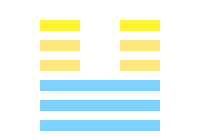
11.6 (11 > 26) - THE THÂI HEXAGRAM.
The sixth line, divided, shows us the city wall returned into the moat. It is not the time to use the army. (The subject of the line) may, indeed, announce his orders to the people of his own city ; but however correct and firm he may be, he will have cause for regret.
Bing DeepL Google Yandex11.6 (11 > 26) - Losing one's base
One is moving away from their goal. Criticism is useless. Protect what matters most.
Bing DeepL Google Yandex11.6 (11 > 26) - Losing one's base
One is moving away from their goal. Criticism is useless. Protect what matters most.
Bing DeepL Google Yandex11.6 (11 > 26) - T’ai, la paix
T’ai : union, pénétration ; libéralité, générosité.
Les murs d’une ville tomberont dans la boue, si elle n’a pas un chef (qui maintienne l’union) : elle se fait alors elle-même son sort et n’aura que honte à attendre.
Ainsi l’ordre qui doit y régner, se trouble.
11.6 (11 > 26) - Perdre son socle
On commence à s'éloigner de son but. Les reproches sont inutiles. Protéger ce qui compte le plus.
Bing DeepL Google Yandex11.6 (11 > 26) - Kötelesség
Kezdi elvéteni a célt. A bírálat semmit sem használ. Védeni kell ami a leglényegesebb.
Bing DeepL Google YandexLa jointure: 12.1
Le dérivé du réciproque. Il représente ce qui aurait pu être fait AVANT pour prévenir la situation décrite par ce trait, un peu comme un remède ou une solution.

12.1 (12 > 25) - THE PHÎ HEXAGRAM.
The first line, divided, suggests the idea of grass pulled up, and bringing with it other stalks with whose roots it is connected. With firm correctness (on the part of its subject), there will be good fortune and progress.
Bing DeepL Google Yandex12.1 (12 > 25) - Make a list of the points to address
If one makes a correction, they will make more.
Bing DeepL Google Yandex12.1 (12 > 25) - Make a list of the points to address
If one makes a correction, they will make more.
Bing DeepL Google Yandex12.1 (12 > 25) - P’î, la décadence
P’ī : 1. Opposition, fermé ; 2. Nuisance, méchanceté ; 3. Blâmer ; 4. Exclamation ayant un sens négatif.
Les plantes dont les racines sont entremêlées (résistent et) ne peuvent être arrachées l’une sans l’autre. (Voir Koua 11, premier trait).
Ceci concerne les princes.
12.1 (12 > 25) - Faire une liste des points à corriger
Si l'on fait une correction, on en fera d'autres.
Bing DeepL Google Yandex12.1 (12 > 25) - Szétzüllesztés
Ha valaki talál egy megoldást, a többiek követni fogják.
Bing DeepL Google YandexLe réciproque : 25.1
L'hexagramme renversé. Il représente la situation opposée, et en tant que tel est essentiel pour la validation des commentaires.

25.1 (25 > 12) - THE WÛ WANG HEXAGRAM.
The first line, undivided, shows its subject free from all insincerity. His advance will be accompanied with good fortune.
Bing DeepL Google Yandex25.1 (25 > 12) - Instinctively refusing
One wants to see the evidence before accepting.
Bing DeepL Google Yandex25.1 (25 > 12) - Instinctively refusing
One wants to see the evidence before accepting.
Bing DeepL Google Yandex25.1 (25 > 12) - Wu wâng, l’innocence, l’imprévu
Wu wāng : sans blâme, irréprochable, honnête.
Quand la conduite est irréprochable, toute démarche est heureuse.
Bing DeepL Google Yandex25.1 (25 > 12) - Refuser instinctivement
On veut voir les preuves avant d'accepter.
Bing DeepL Google YandexMutations

26.6 (26 > 11) - THE TÂ KHÛ HEXAGRAM.
The sixth line, undivided, shows its subject (as) in command of the firmament of heaven. There will be progress.
Bing DeepL Google Yandex26.6 (26 > 11) - Tá tchu, le pouvoir contraignant de la grandeur
Tá tchu : 1. Grand entretien ; 2. Dompter, conduire
Combien la voie du ciel est étendue ! Qu’elle est immense à parcourir !
Allusion à la forme de l’hexagramme qui représente une montagne au-dessus du ciel. Se rapporte à l’expression tchu kih.

26.1.6 (26 > 46) - THE TÂ KHÛ HEXAGRAM.
- 1. The first line, undivided, shows its subject in a position of peril. It will be advantageous for him to stop his advance.
- 6. The sixth line, undivided, shows its subject (as) in command of the firmament of heaven. There will be progress.
26.1.6 (26 > 46) - Preparing for the future
One makes of climate the central question of their intervention.
Bing DeepL Google Yandex26.1.6 (26 > 46) - Preparing for the future
One makes of climate the central question of their intervention.
Bing DeepL Google Yandex26.1.6 (26 > 46) - Tá tchu, le pouvoir contraignant de la grandeur
Tá tchu : 1. Grand entretien ; 2. Dompter, conduire
- 1. Quand il survient quelque danger, il est bon de s’arrêter (se vaincre), de céder aux circonstances et de ne point vouloir l’emporter de force.
-
6. Combien la voie du ciel est étendue ! Qu’elle est immense à parcourir !
Allusion à la forme de l’hexagramme qui représente une montagne au-dessus du ciel. Se rapporte à l’expression tchu kih.
26.1.6 (26 > 46) - Préparer l'avenir
On fait du climat la question centrale de son intervention.
Bing DeepL Google Yandex26.1.6 (26 > 46) - Ellenőrzés
- 1. Nem akar menni és azonnal megnézni mert nem olyan fontos.
- 6. Kérik hogy javítsa meg.
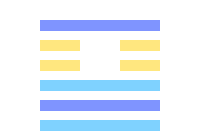
26.2.6 (26 > 36) - THE TÂ KHÛ HEXAGRAM.
- 2. The second line, undivided, shows a carriage with the strap under it removed.
- 6. The sixth line, undivided, shows its subject (as) in command of the firmament of heaven. There will be progress.
26.2.6 (26 > 36) - Restoring the truth
One approves without reservation a measure designed to restore order.
Bing DeepL Google Yandex26.2.6 (26 > 36) - Restoring the truth
One approves without reservation a measure designed to restore order.
Bing DeepL Google Yandex26.2.6 (26 > 36) - Tá tchu, le pouvoir contraignant de la grandeur
Tá tchu : 1. Grand entretien ; 2. Dompter, conduire
- 2. (Comme, par exemple, quand) un char a perdu le cuir qui le maintient en place (droit).
-
6. Combien la voie du ciel est étendue ! Qu’elle est immense à parcourir !
Allusion à la forme de l’hexagramme qui représente une montagne au-dessus du ciel. Se rapporte à l’expression tchu kih.
26.2.6 (26 > 36) - Restaurer la vérité
On approuve sans la moindre réserve une mesure destinée à rétablir l'ordre.
Bing DeepL Google Yandex26.2.6 (26 > 36) - Ellenőrzés
- 2. Otthagyja mert nem bíznak benne.
- 6. Kérik hogy javítsa meg.

26.1.2.6 (26 > 15) - THE TÂ KHÛ HEXAGRAM.
- 1. The first line, undivided, shows its subject in a position of peril. It will be advantageous for him to stop his advance.
- 2. The second line, undivided, shows a carriage with the strap under it removed.
- 6. The sixth line, undivided, shows its subject (as) in command of the firmament of heaven. There will be progress.
26.1.2.6 (26 > 15) - Answering one last time
One recovers their poise the time to fight their last battle.
Bing DeepL Google Yandex26.1.2.6 (26 > 15) - Answering one last time
One recovers their poise the time to fight their last battle.
Bing DeepL Google Yandex26.1.2.6 (26 > 15) - Tá tchu, le pouvoir contraignant de la grandeur
Tá tchu : 1. Grand entretien ; 2. Dompter, conduire
- 1. Quand il survient quelque danger, il est bon de s’arrêter (se vaincre), de céder aux circonstances et de ne point vouloir l’emporter de force.
- 2. (Comme, par exemple, quand) un char a perdu le cuir qui le maintient en place (droit).
-
6. Combien la voie du ciel est étendue ! Qu’elle est immense à parcourir !
Allusion à la forme de l’hexagramme qui représente une montagne au-dessus du ciel. Se rapporte à l’expression tchu kih.
26.1.2.6 (26 > 15) - Répondre une dernière fois
On retrouve son assurance le temps de livrer un dernier combat.
Bing DeepL Google Yandex26.1.2.6 (26 > 15) - Ellenőrzés
- 1. Nem akar menni és azonnal megnézni mert nem olyan fontos.
- 2. Otthagyja mert nem bíznak benne.
- 6. Kérik hogy javítsa meg.

26.3.6 (26 > 19) - THE TÂ KHÛ HEXAGRAM.
- 3. The third line, undivided, shows its subject urging his way with good horses. It will be advantageous for him to realise the difficulty (of his course), and to be firm and correct, exercising himself daily in his charioteering and methods of defence; then there will be advantage in whatever direction he may advance.
- 6. The sixth line, undivided, shows its subject (as) in command of the firmament of heaven. There will be progress.
26.3.6 (26 > 19) - Changing actors
One replaces an element that has become faulty.
Bing DeepL Google Yandex26.3.6 (26 > 19) - Changing actors
One replaces an element that has become faulty.
Bing DeepL Google Yandex26.3.6 (26 > 19) - Tá tchu, le pouvoir contraignant de la grandeur
Tá tchu : 1. Grand entretien ; 2. Dompter, conduire
- 3. Celui qui chemine avec des chevaux bien entretenus, sortira heureusement des difficultés. S’il s’exerce chaque jour à conduire et combattre, tout réussira pour lui. (Suite de la bonne éducation.)
-
6. Combien la voie du ciel est étendue ! Qu’elle est immense à parcourir !
Allusion à la forme de l’hexagramme qui représente une montagne au-dessus du ciel. Se rapporte à l’expression tchu kih.
26.3.6 (26 > 19) - Changer d'acteur
On remplace un élément devenu défectueux.
Bing DeepL Google Yandex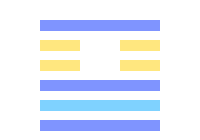
26.1.3.6 (26 > 7) - THE TÂ KHÛ HEXAGRAM.
- 1. The first line, undivided, shows its subject in a position of peril. It will be advantageous for him to stop his advance.
- 3. The third line, undivided, shows its subject urging his way with good horses. It will be advantageous for him to realise the difficulty (of his course), and to be firm and correct, exercising himself daily in his charioteering and methods of defence; then there will be advantage in whatever direction he may advance.
- 6. The sixth line, undivided, shows its subject (as) in command of the firmament of heaven. There will be progress.
26.1.3.6 (26 > 7) - Tá tchu, le pouvoir contraignant de la grandeur
Tá tchu : 1. Grand entretien ; 2. Dompter, conduire
- 1. Quand il survient quelque danger, il est bon de s’arrêter (se vaincre), de céder aux circonstances et de ne point vouloir l’emporter de force.
- 3. Celui qui chemine avec des chevaux bien entretenus, sortira heureusement des difficultés. S’il s’exerce chaque jour à conduire et combattre, tout réussira pour lui. (Suite de la bonne éducation.)
-
6. Combien la voie du ciel est étendue ! Qu’elle est immense à parcourir !
Allusion à la forme de l’hexagramme qui représente une montagne au-dessus du ciel. Se rapporte à l’expression tchu kih.
26.1.3.6 (26 > 7) - Dévider l'écheveau
On s'attend à ce que d'autres choses soient dévoilées.
Bing DeepL Google Yandex26.1.3.6 (26 > 7) - Ellenőrzés
- 1. Nem akar menni és azonnal megnézni mert nem olyan fontos.
- 3. Elkíséri.
- 6. Kérik hogy javítsa meg.

26.2.3.6 (26 > 24) - THE TÂ KHÛ HEXAGRAM.
- 2. The second line, undivided, shows a carriage with the strap under it removed.
- 3. The third line, undivided, shows its subject urging his way with good horses. It will be advantageous for him to realise the difficulty (of his course), and to be firm and correct, exercising himself daily in his charioteering and methods of defence; then there will be advantage in whatever direction he may advance.
- 6. The sixth line, undivided, shows its subject (as) in command of the firmament of heaven. There will be progress.
26.2.3.6 (26 > 24) - Leaving everything
One packs up under the effect of sudden disillusionment.
Bing DeepL Google Yandex26.2.3.6 (26 > 24) - Leaving everything
One packs up under the effect of sudden disillusionment.
Bing DeepL Google Yandex26.2.3.6 (26 > 24) - Tá tchu, le pouvoir contraignant de la grandeur
Tá tchu : 1. Grand entretien ; 2. Dompter, conduire
- 2. (Comme, par exemple, quand) un char a perdu le cuir qui le maintient en place (droit).
- 3. Celui qui chemine avec des chevaux bien entretenus, sortira heureusement des difficultés. S’il s’exerce chaque jour à conduire et combattre, tout réussira pour lui. (Suite de la bonne éducation.)
-
6. Combien la voie du ciel est étendue ! Qu’elle est immense à parcourir !
Allusion à la forme de l’hexagramme qui représente une montagne au-dessus du ciel. Se rapporte à l’expression tchu kih.
26.2.3.6 (26 > 24) - Tout quitter
On plie bagages sous l'effet d'une soudaine désillusion.
Bing DeepL Google Yandex26.2.3.6 (26 > 24) - Ellenőrzés
- 2. Otthagyja mert nem bíznak benne.
- 3. Elkíséri.
- 6. Kérik hogy javítsa meg.
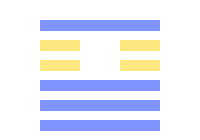
26.1.2.3.6 (26 > 2) - THE TÂ KHÛ HEXAGRAM.
- 1. The first line, undivided, shows its subject in a position of peril. It will be advantageous for him to stop his advance.
- 2. The second line, undivided, shows a carriage with the strap under it removed.
- 3. The third line, undivided, shows its subject urging his way with good horses. It will be advantageous for him to realise the difficulty (of his course), and to be firm and correct, exercising himself daily in his charioteering and methods of defence; then there will be advantage in whatever direction he may advance.
- 6. The sixth line, undivided, shows its subject (as) in command of the firmament of heaven. There will be progress.
26.1.2.3.6 (26 > 2) - Pouring oil on troubled waters
One is going to fail if one shows aggressiveness.
Bing DeepL Google Yandex26.1.2.3.6 (26 > 2) - Pouring oil on troubled waters
One is going to fail if one shows aggressiveness.
Bing DeepL Google Yandex26.1.2.3.6 (26 > 2) - Tá tchu, le pouvoir contraignant de la grandeur
Tá tchu : 1. Grand entretien ; 2. Dompter, conduire
- 1. Quand il survient quelque danger, il est bon de s’arrêter (se vaincre), de céder aux circonstances et de ne point vouloir l’emporter de force.
- 2. (Comme, par exemple, quand) un char a perdu le cuir qui le maintient en place (droit).
- 3. Celui qui chemine avec des chevaux bien entretenus, sortira heureusement des difficultés. S’il s’exerce chaque jour à conduire et combattre, tout réussira pour lui. (Suite de la bonne éducation.)
-
6. Combien la voie du ciel est étendue ! Qu’elle est immense à parcourir !
Allusion à la forme de l’hexagramme qui représente une montagne au-dessus du ciel. Se rapporte à l’expression tchu kih.
26.1.2.3.6 (26 > 2) - Calmer le jeu
On va échouer si on se montre agressif.
Bing DeepL Google Yandex26.1.2.3.6 (26 > 2) - Ellenőrzés
- 1. Nem akar menni és azonnal megnézni mert nem olyan fontos.
- 2. Otthagyja mert nem bíznak benne.
- 3. Elkíséri.
- 6. Kérik hogy javítsa meg.

26.4.6 (26 > 34) - THE TÂ KHÛ HEXAGRAM.
- 4. The fourth line, divided, shows the young bull, (and yet) having the piece of wood over his horns. There will be great good fortune.
- 6. The sixth line, undivided, shows its subject (as) in command of the firmament of heaven. There will be progress.
26.4.6 (26 > 34) - Being retributed for one's actions
One ends up understanding what others have endured when one experiences setbacks of the same kind.
Bing DeepL Google Yandex26.4.6 (26 > 34) - Being retributed for one's actions
One ends up understanding what others have endured when one experiences setbacks of the same kind.
Bing DeepL Google Yandex26.4.6 (26 > 34) - Tá tchu, le pouvoir contraignant de la grandeur
Tá tchu : 1. Grand entretien ; 2. Dompter, conduire
- 4. Le joug, la planchette que porte le jeune boeuf est d’un usage très heureux pour le dompter et le former au labourage (second sens).
-
6. Combien la voie du ciel est étendue ! Qu’elle est immense à parcourir !
Allusion à la forme de l’hexagramme qui représente une montagne au-dessus du ciel. Se rapporte à l’expression tchu kih.
26.4.6 (26 > 34) - Se faire châtier pour ses actes
On finit par comprendre ce que les autres ont enduré quand on subit des revers de même nature.
Bing DeepL Google Yandex26.4.6 (26 > 34) - Ellenőrzés
- 4. A másik erőszakosságának kezelése adakozással.
- 6. Kérik hogy javítsa meg.

26.1.4.6 (26 > 32) - THE TÂ KHÛ HEXAGRAM.
- 1. The first line, undivided, shows its subject in a position of peril. It will be advantageous for him to stop his advance.
- 4. The fourth line, divided, shows the young bull, (and yet) having the piece of wood over his horns. There will be great good fortune.
- 6. The sixth line, undivided, shows its subject (as) in command of the firmament of heaven. There will be progress.
26.1.4.6 (26 > 32) - Dropping the ball
One stumbles while trying to make up for one's mistake.
Bing DeepL Google Yandex26.1.4.6 (26 > 32) - Dropping the ball
One stumbles while trying to make up for one's mistake.
Bing DeepL Google Yandex26.1.4.6 (26 > 32) - Tá tchu, le pouvoir contraignant de la grandeur
Tá tchu : 1. Grand entretien ; 2. Dompter, conduire
- 1. Quand il survient quelque danger, il est bon de s’arrêter (se vaincre), de céder aux circonstances et de ne point vouloir l’emporter de force.
- 4. Le joug, la planchette que porte le jeune boeuf est d’un usage très heureux pour le dompter et le former au labourage (second sens).
-
6. Combien la voie du ciel est étendue ! Qu’elle est immense à parcourir !
Allusion à la forme de l’hexagramme qui représente une montagne au-dessus du ciel. Se rapporte à l’expression tchu kih.
26.1.4.6 (26 > 32) - Cafouiller
On trébuche en tenant de rattraper son erreur.
Bing DeepL Google Yandex26.1.4.6 (26 > 32) - Ellenőrzés
- 1. Nem akar menni és azonnal megnézni mert nem olyan fontos.
- 4. A másik erőszakosságának kezelése adakozással.
- 6. Kérik hogy javítsa meg.
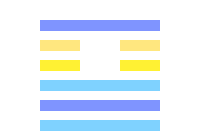
26.2.4.6 (26 > 55) - THE TÂ KHÛ HEXAGRAM.
- 2. The second line, undivided, shows a carriage with the strap under it removed.
- 4. The fourth line, divided, shows the young bull, (and yet) having the piece of wood over his horns. There will be great good fortune.
- 6. The sixth line, undivided, shows its subject (as) in command of the firmament of heaven. There will be progress.
26.2.4.6 (26 > 55) - Having to deal with an unprecedented crisis
Even the most cynical had not foreseen such calamities.
Bing DeepL Google Yandex26.2.4.6 (26 > 55) - Having to deal with an unprecedented crisis
Even the most cynical had not foreseen such calamities.
Bing DeepL Google Yandex26.2.4.6 (26 > 55) - Tá tchu, le pouvoir contraignant de la grandeur
Tá tchu : 1. Grand entretien ; 2. Dompter, conduire
- 2. (Comme, par exemple, quand) un char a perdu le cuir qui le maintient en place (droit).
- 4. Le joug, la planchette que porte le jeune boeuf est d’un usage très heureux pour le dompter et le former au labourage (second sens).
-
6. Combien la voie du ciel est étendue ! Qu’elle est immense à parcourir !
Allusion à la forme de l’hexagramme qui représente une montagne au-dessus du ciel. Se rapporte à l’expression tchu kih.
26.2.4.6 (26 > 55) - Avoir à gérer une crise sans précédent
Même les plus cyniques n'avaient pas prévu de telles calamités.
Bing DeepL Google Yandex26.2.4.6 (26 > 55) - Ellenőrzés
- 2. Otthagyja mert nem bíznak benne.
- 4. A másik erőszakosságának kezelése adakozással.
- 6. Kérik hogy javítsa meg.

26.1.2.4.6 (26 > 62) - THE TÂ KHÛ HEXAGRAM.
- 1. The first line, undivided, shows its subject in a position of peril. It will be advantageous for him to stop his advance.
- 2. The second line, undivided, shows a carriage with the strap under it removed.
- 4. The fourth line, divided, shows the young bull, (and yet) having the piece of wood over his horns. There will be great good fortune.
- 6. The sixth line, undivided, shows its subject (as) in command of the firmament of heaven. There will be progress.
26.1.2.4.6 (26 > 62) - Jumping through hoops
One goes through hardships that others have knowingly placed in the way.
Bing DeepL Google Yandex26.1.2.4.6 (26 > 62) - Jumping through hoops
One goes through hardships that others have knowingly placed in the way.
Bing DeepL Google Yandex26.1.2.4.6 (26 > 62) - Tá tchu, le pouvoir contraignant de la grandeur
Tá tchu : 1. Grand entretien ; 2. Dompter, conduire
- 1. Quand il survient quelque danger, il est bon de s’arrêter (se vaincre), de céder aux circonstances et de ne point vouloir l’emporter de force.
- 2. (Comme, par exemple, quand) un char a perdu le cuir qui le maintient en place (droit).
- 4. Le joug, la planchette que porte le jeune boeuf est d’un usage très heureux pour le dompter et le former au labourage (second sens).
-
6. Combien la voie du ciel est étendue ! Qu’elle est immense à parcourir !
Allusion à la forme de l’hexagramme qui représente une montagne au-dessus du ciel. Se rapporte à l’expression tchu kih.
26.1.2.4.6 (26 > 62) - Franchir un parcours d'obstacles
On traverse des épreuves que les autres ont placé sciemment en travers de la route.
Bing DeepL Google Yandex26.1.2.4.6 (26 > 62) - Ellenőrzés
- 1. Nem akar menni és azonnal megnézni mert nem olyan fontos.
- 2. Otthagyja mert nem bíznak benne.
- 4. A másik erőszakosságának kezelése adakozással.
- 6. Kérik hogy javítsa meg.

26.3.4.6 (26 > 54) - THE TÂ KHÛ HEXAGRAM.
- 3. The third line, undivided, shows its subject urging his way with good horses. It will be advantageous for him to realise the difficulty (of his course), and to be firm and correct, exercising himself daily in his charioteering and methods of defence; then there will be advantage in whatever direction he may advance.
- 4. The fourth line, divided, shows the young bull, (and yet) having the piece of wood over his horns. There will be great good fortune.
- 6. The sixth line, undivided, shows its subject (as) in command of the firmament of heaven. There will be progress.
26.3.4.6 (26 > 54) - Leaving others behind
One continues with one's buddies because the others do not have the same enthusiasm.
26.3.4.6 (26 > 54) - Leaving others behind
One continues with one's buddies because the others do not have the same enthusiasm.
26.3.4.6 (26 > 54) - Tá tchu, le pouvoir contraignant de la grandeur
Tá tchu : 1. Grand entretien ; 2. Dompter, conduire
- 3. Celui qui chemine avec des chevaux bien entretenus, sortira heureusement des difficultés. S’il s’exerce chaque jour à conduire et combattre, tout réussira pour lui. (Suite de la bonne éducation.)
- 4. Le joug, la planchette que porte le jeune boeuf est d’un usage très heureux pour le dompter et le former au labourage (second sens).
-
6. Combien la voie du ciel est étendue ! Qu’elle est immense à parcourir !
Allusion à la forme de l’hexagramme qui représente une montagne au-dessus du ciel. Se rapporte à l’expression tchu kih.
26.3.4.6 (26 > 54) - Lâcher les autres
On continue avec ses copains car les autres n'ont pas le même entrain.
Bing DeepL Google Yandex26.3.4.6 (26 > 54) - Ellenőrzés
- 3. Elkíséri.
- 4. A másik erőszakosságának kezelése adakozással.
- 6. Kérik hogy javítsa meg.
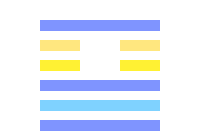
26.1.3.4.6 (26 > 40) - THE TÂ KHÛ HEXAGRAM.
- 1. The first line, undivided, shows its subject in a position of peril. It will be advantageous for him to stop his advance.
- 3. The third line, undivided, shows its subject urging his way with good horses. It will be advantageous for him to realise the difficulty (of his course), and to be firm and correct, exercising himself daily in his charioteering and methods of defence; then there will be advantage in whatever direction he may advance.
- 4. The fourth line, divided, shows the young bull, (and yet) having the piece of wood over his horns. There will be great good fortune.
- 6. The sixth line, undivided, shows its subject (as) in command of the firmament of heaven. There will be progress.
26.1.3.4.6 (26 > 40) - Enjoying an aperitif
One is having a chat over a nice drink while waiting for the preparation to be finished.
Bing DeepL Google Yandex26.1.3.4.6 (26 > 40) - Enjoying an aperitif
One is having a chat over a nice drink while waiting for the preparation to be finished.
Bing DeepL Google Yandex26.1.3.4.6 (26 > 40) - Tá tchu, le pouvoir contraignant de la grandeur
Tá tchu : 1. Grand entretien ; 2. Dompter, conduire
- 1. Quand il survient quelque danger, il est bon de s’arrêter (se vaincre), de céder aux circonstances et de ne point vouloir l’emporter de force.
- 3. Celui qui chemine avec des chevaux bien entretenus, sortira heureusement des difficultés. S’il s’exerce chaque jour à conduire et combattre, tout réussira pour lui. (Suite de la bonne éducation.)
- 4. Le joug, la planchette que porte le jeune boeuf est d’un usage très heureux pour le dompter et le former au labourage (second sens).
-
6. Combien la voie du ciel est étendue ! Qu’elle est immense à parcourir !
Allusion à la forme de l’hexagramme qui représente une montagne au-dessus du ciel. Se rapporte à l’expression tchu kih.
26.1.3.4.6 (26 > 40) - Prendre l'apéritif
On papote autour d'un bon verre en attendant que la préparation soit finie.
Bing DeepL Google Yandex26.1.3.4.6 (26 > 40) - Ellenőrzés
- 1. Nem akar menni és azonnal megnézni mert nem olyan fontos.
- 3. Elkíséri.
- 4. A másik erőszakosságának kezelése adakozással.
- 6. Kérik hogy javítsa meg.

26.2.3.4.6 (26 > 51) - THE TÂ KHÛ HEXAGRAM.
- 2. The second line, undivided, shows a carriage with the strap under it removed.
- 3. The third line, undivided, shows its subject urging his way with good horses. It will be advantageous for him to realise the difficulty (of his course), and to be firm and correct, exercising himself daily in his charioteering and methods of defence; then there will be advantage in whatever direction he may advance.
- 4. The fourth line, divided, shows the young bull, (and yet) having the piece of wood over his horns. There will be great good fortune.
- 6. The sixth line, undivided, shows its subject (as) in command of the firmament of heaven. There will be progress.
26.2.3.4.6 (26 > 51) - Thinking wisely
One is not doing well when one makes decisions that one abandons immediately afterwards.
Bing DeepL Google Yandex26.2.3.4.6 (26 > 51) - Thinking wisely
One is not doing well when one makes decisions that one abandons immediately afterwards.
Bing DeepL Google Yandex26.2.3.4.6 (26 > 51) - Tá tchu, le pouvoir contraignant de la grandeur
Tá tchu : 1. Grand entretien ; 2. Dompter, conduire
- 2. (Comme, par exemple, quand) un char a perdu le cuir qui le maintient en place (droit).
- 3. Celui qui chemine avec des chevaux bien entretenus, sortira heureusement des difficultés. S’il s’exerce chaque jour à conduire et combattre, tout réussira pour lui. (Suite de la bonne éducation.)
- 4. Le joug, la planchette que porte le jeune boeuf est d’un usage très heureux pour le dompter et le former au labourage (second sens).
-
6. Combien la voie du ciel est étendue ! Qu’elle est immense à parcourir !
Allusion à la forme de l’hexagramme qui représente une montagne au-dessus du ciel. Se rapporte à l’expression tchu kih.
26.2.3.4.6 (26 > 51) - Avoir de la suite dans les idées
On ne tourne pas rond quand on prend des décisions que l'on abandonne tout de suite après.
Bing DeepL Google Yandex26.2.3.4.6 (26 > 51) - Ellenőrzés
- 2. Otthagyja mert nem bíznak benne.
- 3. Elkíséri.
- 4. A másik erőszakosságának kezelése adakozással.
- 6. Kérik hogy javítsa meg.
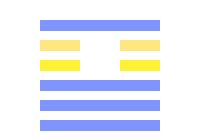
26.1.2.3.4.6 (26 > 16) - THE TÂ KHÛ HEXAGRAM.
- 1. The first line, undivided, shows its subject in a position of peril. It will be advantageous for him to stop his advance.
- 2. The second line, undivided, shows a carriage with the strap under it removed.
- 3. The third line, undivided, shows its subject urging his way with good horses. It will be advantageous for him to realise the difficulty (of his course), and to be firm and correct, exercising himself daily in his charioteering and methods of defence; then there will be advantage in whatever direction he may advance.
- 4. The fourth line, divided, shows the young bull, (and yet) having the piece of wood over his horns. There will be great good fortune.
- 6. The sixth line, undivided, shows its subject (as) in command of the firmament of heaven. There will be progress.
26.1.2.3.4.6 (26 > 16) - Paving the way for research
One sharpens one's hypothesis by calling for new studies.
Bing DeepL Google Yandex26.1.2.3.4.6 (26 > 16) - Paving the way for research
One sharpens one's hypothesis by calling for new studies.
Bing DeepL Google Yandex26.1.2.3.4.6 (26 > 16) - Tá tchu, le pouvoir contraignant de la grandeur
Tá tchu : 1. Grand entretien ; 2. Dompter, conduire
- 1. Quand il survient quelque danger, il est bon de s’arrêter (se vaincre), de céder aux circonstances et de ne point vouloir l’emporter de force.
- 2. (Comme, par exemple, quand) un char a perdu le cuir qui le maintient en place (droit).
- 3. Celui qui chemine avec des chevaux bien entretenus, sortira heureusement des difficultés. S’il s’exerce chaque jour à conduire et combattre, tout réussira pour lui. (Suite de la bonne éducation.)
- 4. Le joug, la planchette que porte le jeune boeuf est d’un usage très heureux pour le dompter et le former au labourage (second sens).
-
6. Combien la voie du ciel est étendue ! Qu’elle est immense à parcourir !
Allusion à la forme de l’hexagramme qui représente une montagne au-dessus du ciel. Se rapporte à l’expression tchu kih.
26.1.2.3.4.6 (26 > 16) - Ouvrir la voie à la recherche
On affute son hypothèse en réclamant de nouvelles études.
Bing DeepL Google Yandex26.1.2.3.4.6 (26 > 16) - Ellenőrzés
- 1. Nem akar menni és azonnal megnézni mert nem olyan fontos.
- 2. Otthagyja mert nem bíznak benne.
- 3. Elkíséri.
- 4. A másik erőszakosságának kezelése adakozással.
- 6. Kérik hogy javítsa meg.

26.5.6 (26 > 5) - THE TÂ KHÛ HEXAGRAM.
- 5. The fifth line, divided, shows the teeth of a castrated hog. There will be good fortune.
- 6. The sixth line, undivided, shows its subject (as) in command of the firmament of heaven. There will be progress.
26.5.6 (26 > 5) - Worrying for one's entourage
One hopes that one's relatives will not be bothered by the events.
Bing DeepL Google Yandex26.5.6 (26 > 5) - Worrying for one's entourage
One hopes that one's relatives will not be bothered by the events.
Bing DeepL Google Yandex26.5.6 (26 > 5) - Tá tchu, le pouvoir contraignant de la grandeur
Tá tchu : 1. Grand entretien ; 2. Dompter, conduire
- 5. Lorsqu’un sanglier est châtré, dompté, ses défenses sont exemptes de danger (et sont plutôt un instrument utile). — Arracher les dents à un sanglier, c’est priver un méchant des moyens de nuire.
-
6. Combien la voie du ciel est étendue ! Qu’elle est immense à parcourir !
Allusion à la forme de l’hexagramme qui représente une montagne au-dessus du ciel. Se rapporte à l’expression tchu kih.
26.5.6 (26 > 5) - Se faire du souci pour son entourage
On espère que ses proches ne seront pas gênés par les événements.
Bing DeepL Google Yandex26.5.6 (26 > 5) - Ellenőrzés
- 5. Vár amíg a legfiatalabb visszatér javítani.
- 6. Kérik hogy javítsa meg.

26.1.5.6 (26 > 48) - THE TÂ KHÛ HEXAGRAM.
- 1. The first line, undivided, shows its subject in a position of peril. It will be advantageous for him to stop his advance.
- 5. The fifth line, divided, shows the teeth of a castrated hog. There will be good fortune.
- 6. The sixth line, undivided, shows its subject (as) in command of the firmament of heaven. There will be progress.
26.1.5.6 (26 > 48) - Adjusting one's particiipation
One makes precise calculations to know how much effort remains to be done.
Bing DeepL Google Yandex26.1.5.6 (26 > 48) - Adjusting one's particiipation
One makes precise calculations to know how much effort remains to be done.
Bing DeepL Google Yandex26.1.5.6 (26 > 48) - Tá tchu, le pouvoir contraignant de la grandeur
Tá tchu : 1. Grand entretien ; 2. Dompter, conduire
- 1. Quand il survient quelque danger, il est bon de s’arrêter (se vaincre), de céder aux circonstances et de ne point vouloir l’emporter de force.
- 5. Lorsqu’un sanglier est châtré, dompté, ses défenses sont exemptes de danger (et sont plutôt un instrument utile). — Arracher les dents à un sanglier, c’est priver un méchant des moyens de nuire.
-
6. Combien la voie du ciel est étendue ! Qu’elle est immense à parcourir !
Allusion à la forme de l’hexagramme qui représente une montagne au-dessus du ciel. Se rapporte à l’expression tchu kih.
26.1.5.6 (26 > 48) - Doser sa participation
On fait des calculs précis pour savoir les efforts qu'il reste à fournir.
Bing DeepL Google Yandex26.1.5.6 (26 > 48) - Ellenőrzés
- 1. Nem akar menni és azonnal megnézni mert nem olyan fontos.
- 5. Vár amíg a legfiatalabb visszatér javítani.
- 6. Kérik hogy javítsa meg.
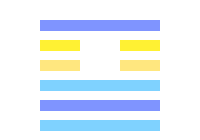
26.2.5.6 (26 > 63) - THE TÂ KHÛ HEXAGRAM.
- 2. The second line, undivided, shows a carriage with the strap under it removed.
- 5. The fifth line, divided, shows the teeth of a castrated hog. There will be good fortune.
- 6. The sixth line, undivided, shows its subject (as) in command of the firmament of heaven. There will be progress.
26.2.5.6 (26 > 63) - Being in denial
One claims one's innocence without answering the accusations that have been made.
Bing DeepL Google Yandex26.2.5.6 (26 > 63) - Being in denial
One claims one's innocence without answering the accusations that have been made.
Bing DeepL Google Yandex26.2.5.6 (26 > 63) - Tá tchu, le pouvoir contraignant de la grandeur
Tá tchu : 1. Grand entretien ; 2. Dompter, conduire
- 2. (Comme, par exemple, quand) un char a perdu le cuir qui le maintient en place (droit).
- 5. Lorsqu’un sanglier est châtré, dompté, ses défenses sont exemptes de danger (et sont plutôt un instrument utile). — Arracher les dents à un sanglier, c’est priver un méchant des moyens de nuire.
-
6. Combien la voie du ciel est étendue ! Qu’elle est immense à parcourir !
Allusion à la forme de l’hexagramme qui représente une montagne au-dessus du ciel. Se rapporte à l’expression tchu kih.
26.2.5.6 (26 > 63) - Être dans le déni
On clame son innocence sans répondre aux accusations qui ont été formulées.
Bing DeepL Google Yandex26.2.5.6 (26 > 63) - Ellenőrzés
- 2. Otthagyja mert nem bíznak benne.
- 5. Vár amíg a legfiatalabb visszatér javítani.
- 6. Kérik hogy javítsa meg.

26.1.2.5.6 (26 > 39) - THE TÂ KHÛ HEXAGRAM.
- 1. The first line, undivided, shows its subject in a position of peril. It will be advantageous for him to stop his advance.
- 2. The second line, undivided, shows a carriage with the strap under it removed.
- 5. The fifth line, divided, shows the teeth of a castrated hog. There will be good fortune.
- 6. The sixth line, undivided, shows its subject (as) in command of the firmament of heaven. There will be progress.
26.1.2.5.6 (26 > 39) - Ensuring succession
One takes over from those who have fought all the time.
Bing DeepL Google Yandex26.1.2.5.6 (26 > 39) - Ensuring succession
One takes over from those who have fought all the time.
Bing DeepL Google Yandex26.1.2.5.6 (26 > 39) - Tá tchu, le pouvoir contraignant de la grandeur
Tá tchu : 1. Grand entretien ; 2. Dompter, conduire
- 1. Quand il survient quelque danger, il est bon de s’arrêter (se vaincre), de céder aux circonstances et de ne point vouloir l’emporter de force.
- 2. (Comme, par exemple, quand) un char a perdu le cuir qui le maintient en place (droit).
- 5. Lorsqu’un sanglier est châtré, dompté, ses défenses sont exemptes de danger (et sont plutôt un instrument utile). — Arracher les dents à un sanglier, c’est priver un méchant des moyens de nuire.
-
6. Combien la voie du ciel est étendue ! Qu’elle est immense à parcourir !
Allusion à la forme de l’hexagramme qui représente une montagne au-dessus du ciel. Se rapporte à l’expression tchu kih.
26.1.2.5.6 (26 > 39) - Assurer la relève
On prend le relai de ceux qui ont combattu sans arrêt.
Bing DeepL Google Yandex26.1.2.5.6 (26 > 39) - Ellenőrzés
- 1. Nem akar menni és azonnal megnézni mert nem olyan fontos.
- 2. Otthagyja mert nem bíznak benne.
- 5. Vár amíg a legfiatalabb visszatér javítani.
- 6. Kérik hogy javítsa meg.

26.3.5.6 (26 > 60) - THE TÂ KHÛ HEXAGRAM.
- 3. The third line, undivided, shows its subject urging his way with good horses. It will be advantageous for him to realise the difficulty (of his course), and to be firm and correct, exercising himself daily in his charioteering and methods of defence; then there will be advantage in whatever direction he may advance.
- 5. The fifth line, divided, shows the teeth of a castrated hog. There will be good fortune.
- 6. The sixth line, undivided, shows its subject (as) in command of the firmament of heaven. There will be progress.
26.3.5.6 (26 > 60) - Reaching the end of the tunnel
One overcomes the last obstacles to get to the end of one's project.
Bing DeepL Google Yandex26.3.5.6 (26 > 60) - Reaching the end of the tunnel
One overcomes the last obstacles to get to the end of one's project.
Bing DeepL Google Yandex26.3.5.6 (26 > 60) - Tá tchu, le pouvoir contraignant de la grandeur
Tá tchu : 1. Grand entretien ; 2. Dompter, conduire
- 3. Celui qui chemine avec des chevaux bien entretenus, sortira heureusement des difficultés. S’il s’exerce chaque jour à conduire et combattre, tout réussira pour lui. (Suite de la bonne éducation.)
- 5. Lorsqu’un sanglier est châtré, dompté, ses défenses sont exemptes de danger (et sont plutôt un instrument utile). — Arracher les dents à un sanglier, c’est priver un méchant des moyens de nuire.
-
6. Combien la voie du ciel est étendue ! Qu’elle est immense à parcourir !
Allusion à la forme de l’hexagramme qui représente une montagne au-dessus du ciel. Se rapporte à l’expression tchu kih.
26.3.5.6 (26 > 60) - Sortir du tunnel
On triomphe des derniers obstacles pour arriver à la fin de son projet.
Bing DeepL Google Yandex26.3.5.6 (26 > 60) - Ellenőrzés
- 3. Elkíséri.
- 5. Vár amíg a legfiatalabb visszatér javítani.
- 6. Kérik hogy javítsa meg.

26.1.3.5.6 (26 > 29) - THE TÂ KHÛ HEXAGRAM.
- 1. The first line, undivided, shows its subject in a position of peril. It will be advantageous for him to stop his advance.
- 3. The third line, undivided, shows its subject urging his way with good horses. It will be advantageous for him to realise the difficulty (of his course), and to be firm and correct, exercising himself daily in his charioteering and methods of defence; then there will be advantage in whatever direction he may advance.
- 5. The fifth line, divided, shows the teeth of a castrated hog. There will be good fortune.
- 6. The sixth line, undivided, shows its subject (as) in command of the firmament of heaven. There will be progress.
26.1.3.5.6 (26 > 29) - Interrupting all the time
One cultivates a sense of timeliness by intervening at every opportunity.
Bing DeepL Google Yandex26.1.3.5.6 (26 > 29) - Interrupting all the time
One cultivates a sense of timeliness by intervening at every opportunity.
Bing DeepL Google Yandex26.1.3.5.6 (26 > 29) - Tá tchu, le pouvoir contraignant de la grandeur
Tá tchu : 1. Grand entretien ; 2. Dompter, conduire
- 1. Quand il survient quelque danger, il est bon de s’arrêter (se vaincre), de céder aux circonstances et de ne point vouloir l’emporter de force.
- 3. Celui qui chemine avec des chevaux bien entretenus, sortira heureusement des difficultés. S’il s’exerce chaque jour à conduire et combattre, tout réussira pour lui. (Suite de la bonne éducation.)
- 5. Lorsqu’un sanglier est châtré, dompté, ses défenses sont exemptes de danger (et sont plutôt un instrument utile). — Arracher les dents à un sanglier, c’est priver un méchant des moyens de nuire.
-
6. Combien la voie du ciel est étendue ! Qu’elle est immense à parcourir !
Allusion à la forme de l’hexagramme qui représente une montagne au-dessus du ciel. Se rapporte à l’expression tchu kih.
26.1.3.5.6 (26 > 29) - Interrompre sans arrêt
On cultive son sens de l'à-propos en intervenant à tout bout de champ.
Bing DeepL Google Yandex26.1.3.5.6 (26 > 29) - Ellenőrzés
- 1. Nem akar menni és azonnal megnézni mert nem olyan fontos.
- 3. Elkíséri.
- 5. Vár amíg a legfiatalabb visszatér javítani.
- 6. Kérik hogy javítsa meg.

26.2.3.5.6 (26 > 3) - THE TÂ KHÛ HEXAGRAM.
- 2. The second line, undivided, shows a carriage with the strap under it removed.
- 3. The third line, undivided, shows its subject urging his way with good horses. It will be advantageous for him to realise the difficulty (of his course), and to be firm and correct, exercising himself daily in his charioteering and methods of defence; then there will be advantage in whatever direction he may advance.
- 5. The fifth line, divided, shows the teeth of a castrated hog. There will be good fortune.
- 6. The sixth line, undivided, shows its subject (as) in command of the firmament of heaven. There will be progress.
26.2.3.5.6 (26 > 3) - Respecting differences
One may hurt others if one does not pay attention to their whims.
Bing DeepL Google Yandex26.2.3.5.6 (26 > 3) - Respecting differences
One may hurt others if one does not pay attention to their whims.
Bing DeepL Google Yandex26.2.3.5.6 (26 > 3) - Tá tchu, le pouvoir contraignant de la grandeur
Tá tchu : 1. Grand entretien ; 2. Dompter, conduire
- 2. (Comme, par exemple, quand) un char a perdu le cuir qui le maintient en place (droit).
- 3. Celui qui chemine avec des chevaux bien entretenus, sortira heureusement des difficultés. S’il s’exerce chaque jour à conduire et combattre, tout réussira pour lui. (Suite de la bonne éducation.)
- 5. Lorsqu’un sanglier est châtré, dompté, ses défenses sont exemptes de danger (et sont plutôt un instrument utile). — Arracher les dents à un sanglier, c’est priver un méchant des moyens de nuire.
-
6. Combien la voie du ciel est étendue ! Qu’elle est immense à parcourir !
Allusion à la forme de l’hexagramme qui représente une montagne au-dessus du ciel. Se rapporte à l’expression tchu kih.
26.2.3.5.6 (26 > 3) - Respecter les différences
On peut blesser les autres si l'on ne fait pas attention à leurs caprices.
Bing DeepL Google Yandex26.2.3.5.6 (26 > 3) - Ellenőrzés
- 2. Otthagyja mert nem bíznak benne.
- 3. Elkíséri.
- 5. Vár amíg a legfiatalabb visszatér javítani.
- 6. Kérik hogy javítsa meg.

26.1.2.3.5.6 (26 > 8) - THE TÂ KHÛ HEXAGRAM.
- 1. The first line, undivided, shows its subject in a position of peril. It will be advantageous for him to stop his advance.
- 2. The second line, undivided, shows a carriage with the strap under it removed.
- 3. The third line, undivided, shows its subject urging his way with good horses. It will be advantageous for him to realise the difficulty (of his course), and to be firm and correct, exercising himself daily in his charioteering and methods of defence; then there will be advantage in whatever direction he may advance.
- 5. The fifth line, divided, shows the teeth of a castrated hog. There will be good fortune.
- 6. The sixth line, undivided, shows its subject (as) in command of the firmament of heaven. There will be progress.
26.1.2.3.5.6 (26 > 8) - Rising to overcome obstacles
One has climbed the steps that lead to the success of one's projects.
Bing DeepL Google Yandex26.1.2.3.5.6 (26 > 8) - Rising to overcome obstacles
One has climbed the steps that lead to the success of one's projects.
Bing DeepL Google Yandex26.1.2.3.5.6 (26 > 8) - Tá tchu, le pouvoir contraignant de la grandeur
Tá tchu : 1. Grand entretien ; 2. Dompter, conduire
- 1. Quand il survient quelque danger, il est bon de s’arrêter (se vaincre), de céder aux circonstances et de ne point vouloir l’emporter de force.
- 2. (Comme, par exemple, quand) un char a perdu le cuir qui le maintient en place (droit).
- 3. Celui qui chemine avec des chevaux bien entretenus, sortira heureusement des difficultés. S’il s’exerce chaque jour à conduire et combattre, tout réussira pour lui. (Suite de la bonne éducation.)
- 5. Lorsqu’un sanglier est châtré, dompté, ses défenses sont exemptes de danger (et sont plutôt un instrument utile). — Arracher les dents à un sanglier, c’est priver un méchant des moyens de nuire.
-
6. Combien la voie du ciel est étendue ! Qu’elle est immense à parcourir !
Allusion à la forme de l’hexagramme qui représente une montagne au-dessus du ciel. Se rapporte à l’expression tchu kih.
26.1.2.3.5.6 (26 > 8) - S'élever pour franchir les obstacles
On a gravi les marches qui mènent à la réussite de ses projets.
Bing DeepL Google Yandex26.1.2.3.5.6 (26 > 8) - Ellenőrzés
- 1. Nem akar menni és azonnal megnézni mert nem olyan fontos.
- 2. Otthagyja mert nem bíznak benne.
- 3. Elkíséri.
- 5. Vár amíg a legfiatalabb visszatér javítani.
- 6. Kérik hogy javítsa meg.

26.4.5.6 (26 > 43) - THE TÂ KHÛ HEXAGRAM.
- 4. The fourth line, divided, shows the young bull, (and yet) having the piece of wood over his horns. There will be great good fortune.
- 5. The fifth line, divided, shows the teeth of a castrated hog. There will be good fortune.
- 6. The sixth line, undivided, shows its subject (as) in command of the firmament of heaven. There will be progress.
26.4.5.6 (26 > 43) - Plugging holes
One is preparing to replace those one has lost.
Bing DeepL Google Yandex26.4.5.6 (26 > 43) - Plugging holes
One is preparing to replace those one has lost.
Bing DeepL Google Yandex26.4.5.6 (26 > 43) - Tá tchu, le pouvoir contraignant de la grandeur
Tá tchu : 1. Grand entretien ; 2. Dompter, conduire
- 4. Le joug, la planchette que porte le jeune boeuf est d’un usage très heureux pour le dompter et le former au labourage (second sens).
- 5. Lorsqu’un sanglier est châtré, dompté, ses défenses sont exemptes de danger (et sont plutôt un instrument utile). — Arracher les dents à un sanglier, c’est priver un méchant des moyens de nuire.
-
6. Combien la voie du ciel est étendue ! Qu’elle est immense à parcourir !
Allusion à la forme de l’hexagramme qui représente une montagne au-dessus du ciel. Se rapporte à l’expression tchu kih.
26.4.5.6 (26 > 43) - Boucher les trous
On se prépare à remplacer ceux qu'on a perdu.
Bing DeepL Google Yandex26.4.5.6 (26 > 43) - Ellenőrzés
- 4. A másik erőszakosságának kezelése adakozással.
- 5. Vár amíg a legfiatalabb visszatér javítani.
- 6. Kérik hogy javítsa meg.
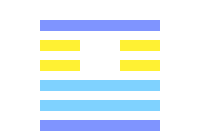
26.1.4.5.6 (26 > 28) - THE TÂ KHÛ HEXAGRAM.
- 1. The first line, undivided, shows its subject in a position of peril. It will be advantageous for him to stop his advance.
- 4. The fourth line, divided, shows the young bull, (and yet) having the piece of wood over his horns. There will be great good fortune.
- 5. The fifth line, divided, shows the teeth of a castrated hog. There will be good fortune.
- 6. The sixth line, undivided, shows its subject (as) in command of the firmament of heaven. There will be progress.
26.1.4.5.6 (26 > 28) - Drawing an outline
One traces a line around the established perimeter.
Bing DeepL Google Yandex26.1.4.5.6 (26 > 28) - Drawing an outline
One traces a line around the established perimeter.
Bing DeepL Google Yandex26.1.4.5.6 (26 > 28) - Tá tchu, le pouvoir contraignant de la grandeur
Tá tchu : 1. Grand entretien ; 2. Dompter, conduire
- 1. Quand il survient quelque danger, il est bon de s’arrêter (se vaincre), de céder aux circonstances et de ne point vouloir l’emporter de force.
- 4. Le joug, la planchette que porte le jeune boeuf est d’un usage très heureux pour le dompter et le former au labourage (second sens).
- 5. Lorsqu’un sanglier est châtré, dompté, ses défenses sont exemptes de danger (et sont plutôt un instrument utile). — Arracher les dents à un sanglier, c’est priver un méchant des moyens de nuire.
-
6. Combien la voie du ciel est étendue ! Qu’elle est immense à parcourir !
Allusion à la forme de l’hexagramme qui représente une montagne au-dessus du ciel. Se rapporte à l’expression tchu kih.
26.1.4.5.6 (26 > 28) - Dessiner le contour
On trace un trait autour du périmètre que l'on a établi.
Bing DeepL Google Yandex26.1.4.5.6 (26 > 28) - Ellenőrzés
- 1. Nem akar menni és azonnal megnézni mert nem olyan fontos.
- 4. A másik erőszakosságának kezelése adakozással.
- 5. Vár amíg a legfiatalabb visszatér javítani.
- 6. Kérik hogy javítsa meg.
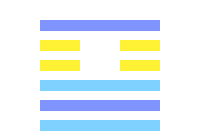
26.2.4.5.6 (26 > 49) - THE TÂ KHÛ HEXAGRAM.
- 2. The second line, undivided, shows a carriage with the strap under it removed.
- 4. The fourth line, divided, shows the young bull, (and yet) having the piece of wood over his horns. There will be great good fortune.
- 5. The fifth line, divided, shows the teeth of a castrated hog. There will be good fortune.
- 6. The sixth line, undivided, shows its subject (as) in command of the firmament of heaven. There will be progress.
26.2.4.5.6 (26 > 49) - Needing to be comforted
One rushes when the others call because one is overwhelmed with worry.
Bing DeepL Google Yandex26.2.4.5.6 (26 > 49) - Needing to be comforted
One rushes when the others call because one is overwhelmed with worry.
Bing DeepL Google Yandex26.2.4.5.6 (26 > 49) - Tá tchu, le pouvoir contraignant de la grandeur
Tá tchu : 1. Grand entretien ; 2. Dompter, conduire
- 2. (Comme, par exemple, quand) un char a perdu le cuir qui le maintient en place (droit).
- 4. Le joug, la planchette que porte le jeune boeuf est d’un usage très heureux pour le dompter et le former au labourage (second sens).
- 5. Lorsqu’un sanglier est châtré, dompté, ses défenses sont exemptes de danger (et sont plutôt un instrument utile). — Arracher les dents à un sanglier, c’est priver un méchant des moyens de nuire.
-
6. Combien la voie du ciel est étendue ! Qu’elle est immense à parcourir !
Allusion à la forme de l’hexagramme qui représente une montagne au-dessus du ciel. Se rapporte à l’expression tchu kih.
26.2.4.5.6 (26 > 49) - Avoir besoin de réconfort
On accourt quand les autres appellent car on déborde d'inquiétude.
Bing DeepL Google Yandex26.2.4.5.6 (26 > 49) - Ellenőrzés
- 2. Otthagyja mert nem bíznak benne.
- 4. A másik erőszakosságának kezelése adakozással.
- 5. Vár amíg a legfiatalabb visszatér javítani.
- 6. Kérik hogy javítsa meg.
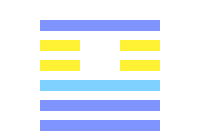
26.1.2.4.5.6 (26 > 31) - THE TÂ KHÛ HEXAGRAM.
- 1. The first line, undivided, shows its subject in a position of peril. It will be advantageous for him to stop his advance.
- 2. The second line, undivided, shows a carriage with the strap under it removed.
- 4. The fourth line, divided, shows the young bull, (and yet) having the piece of wood over his horns. There will be great good fortune.
- 5. The fifth line, divided, shows the teeth of a castrated hog. There will be good fortune.
- 6. The sixth line, undivided, shows its subject (as) in command of the firmament of heaven. There will be progress.
26.1.2.4.5.6 (26 > 31) - Getting a head start
One hopes to be able to declare one's flame before the others.
Bing DeepL Google Yandex26.1.2.4.5.6 (26 > 31) - Getting a head start
One hopes to be able to declare one's flame before the others.
Bing DeepL Google Yandex26.1.2.4.5.6 (26 > 31) - Tá tchu, le pouvoir contraignant de la grandeur
Tá tchu : 1. Grand entretien ; 2. Dompter, conduire
- 1. Quand il survient quelque danger, il est bon de s’arrêter (se vaincre), de céder aux circonstances et de ne point vouloir l’emporter de force.
- 2. (Comme, par exemple, quand) un char a perdu le cuir qui le maintient en place (droit).
- 4. Le joug, la planchette que porte le jeune boeuf est d’un usage très heureux pour le dompter et le former au labourage (second sens).
- 5. Lorsqu’un sanglier est châtré, dompté, ses défenses sont exemptes de danger (et sont plutôt un instrument utile). — Arracher les dents à un sanglier, c’est priver un méchant des moyens de nuire.
-
6. Combien la voie du ciel est étendue ! Qu’elle est immense à parcourir !
Allusion à la forme de l’hexagramme qui représente une montagne au-dessus du ciel. Se rapporte à l’expression tchu kih.
26.1.2.4.5.6 (26 > 31) - Prendre de vitesse
On espère pouvoir déclarer sa flamme avant les autres.
Bing DeepL Google Yandex26.1.2.4.5.6 (26 > 31) - Ellenőrzés
- 1. Nem akar menni és azonnal megnézni mert nem olyan fontos.
- 2. Otthagyja mert nem bíznak benne.
- 4. A másik erőszakosságának kezelése adakozással.
- 5. Vár amíg a legfiatalabb visszatér javítani.
- 6. Kérik hogy javítsa meg.

26.3.4.5.6 (26 > 58) - THE TÂ KHÛ HEXAGRAM.
- 3. The third line, undivided, shows its subject urging his way with good horses. It will be advantageous for him to realise the difficulty (of his course), and to be firm and correct, exercising himself daily in his charioteering and methods of defence; then there will be advantage in whatever direction he may advance.
- 4. The fourth line, divided, shows the young bull, (and yet) having the piece of wood over his horns. There will be great good fortune.
- 5. The fifth line, divided, shows the teeth of a castrated hog. There will be good fortune.
- 6. The sixth line, undivided, shows its subject (as) in command of the firmament of heaven. There will be progress.
26.3.4.5.6 (26 > 58) - Magnifying
One increases the distance from which others can watch.
Bing DeepL Google Yandex26.3.4.5.6 (26 > 58) - Magnifying
One increases the distance from which others can watch.
Bing DeepL Google Yandex26.3.4.5.6 (26 > 58) - Tá tchu, le pouvoir contraignant de la grandeur
Tá tchu : 1. Grand entretien ; 2. Dompter, conduire
- 3. Celui qui chemine avec des chevaux bien entretenus, sortira heureusement des difficultés. S’il s’exerce chaque jour à conduire et combattre, tout réussira pour lui. (Suite de la bonne éducation.)
- 4. Le joug, la planchette que porte le jeune boeuf est d’un usage très heureux pour le dompter et le former au labourage (second sens).
- 5. Lorsqu’un sanglier est châtré, dompté, ses défenses sont exemptes de danger (et sont plutôt un instrument utile). — Arracher les dents à un sanglier, c’est priver un méchant des moyens de nuire.
-
6. Combien la voie du ciel est étendue ! Qu’elle est immense à parcourir !
Allusion à la forme de l’hexagramme qui représente une montagne au-dessus du ciel. Se rapporte à l’expression tchu kih.
26.3.4.5.6 (26 > 58) - Magnifier
On accroît la distance depuis laquelle les autres pourront regarder.
Bing DeepL Google Yandex26.3.4.5.6 (26 > 58) - Ellenőrzés
- 3. Elkíséri.
- 4. A másik erőszakosságának kezelése adakozással.
- 5. Vár amíg a legfiatalabb visszatér javítani.
- 6. Kérik hogy javítsa meg.
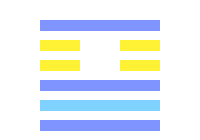
26.1.3.4.5.6 (26 > 47) - THE TÂ KHÛ HEXAGRAM.
- 1. The first line, undivided, shows its subject in a position of peril. It will be advantageous for him to stop his advance.
- 3. The third line, undivided, shows its subject urging his way with good horses. It will be advantageous for him to realise the difficulty (of his course), and to be firm and correct, exercising himself daily in his charioteering and methods of defence; then there will be advantage in whatever direction he may advance.
- 4. The fourth line, divided, shows the young bull, (and yet) having the piece of wood over his horns. There will be great good fortune.
- 5. The fifth line, divided, shows the teeth of a castrated hog. There will be good fortune.
- 6. The sixth line, undivided, shows its subject (as) in command of the firmament of heaven. There will be progress.
26.1.3.4.5.6 (26 > 47) - Imposing deadlines
One penalises those who have not been able to respond in a timely manner.
Bing DeepL Google Yandex26.1.3.4.5.6 (26 > 47) - Imposing deadlines
One penalizes those who have not been able to respond in a timely manner.
Bing DeepL Google Yandex26.1.3.4.5.6 (26 > 47) - Tá tchu, le pouvoir contraignant de la grandeur
Tá tchu : 1. Grand entretien ; 2. Dompter, conduire
- 1. Quand il survient quelque danger, il est bon de s’arrêter (se vaincre), de céder aux circonstances et de ne point vouloir l’emporter de force.
- 3. Celui qui chemine avec des chevaux bien entretenus, sortira heureusement des difficultés. S’il s’exerce chaque jour à conduire et combattre, tout réussira pour lui. (Suite de la bonne éducation.)
- 4. Le joug, la planchette que porte le jeune boeuf est d’un usage très heureux pour le dompter et le former au labourage (second sens).
- 5. Lorsqu’un sanglier est châtré, dompté, ses défenses sont exemptes de danger (et sont plutôt un instrument utile). — Arracher les dents à un sanglier, c’est priver un méchant des moyens de nuire.
-
6. Combien la voie du ciel est étendue ! Qu’elle est immense à parcourir !
Allusion à la forme de l’hexagramme qui représente une montagne au-dessus du ciel. Se rapporte à l’expression tchu kih.
26.1.3.4.5.6 (26 > 47) - Imposer des délais
On pénalise ceux qui n'ont pas su répondre en temps utile.
Bing DeepL Google Yandex26.1.3.4.5.6 (26 > 47) - Ellenőrzés
- 1. Nem akar menni és azonnal megnézni mert nem olyan fontos.
- 3. Elkíséri.
- 4. A másik erőszakosságának kezelése adakozással.
- 5. Vár amíg a legfiatalabb visszatér javítani.
- 6. Kérik hogy javítsa meg.
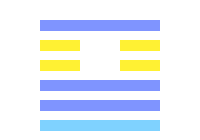
26.2.3.4.5.6 (26 > 17) - THE TÂ KHÛ HEXAGRAM.
- 2. The second line, undivided, shows a carriage with the strap under it removed.
- 3. The third line, undivided, shows its subject urging his way with good horses. It will be advantageous for him to realise the difficulty (of his course), and to be firm and correct, exercising himself daily in his charioteering and methods of defence; then there will be advantage in whatever direction he may advance.
- 4. The fourth line, divided, shows the young bull, (and yet) having the piece of wood over his horns. There will be great good fortune.
- 5. The fifth line, divided, shows the teeth of a castrated hog. There will be good fortune.
- 6. The sixth line, undivided, shows its subject (as) in command of the firmament of heaven. There will be progress.
26.2.3.4.5.6 (26 > 17) - Self-censorship
One learns to pay attention to the ideas one develops when they may offend the sensibilities of younger people.
Bing DeepL Google Yandex26.2.3.4.5.6 (26 > 17) - Self-censorship
One learns to pay attention to the ideas one develops when they may offend the sensibilities of younger people.
Bing DeepL Google Yandex26.2.3.4.5.6 (26 > 17) - Tá tchu, le pouvoir contraignant de la grandeur
Tá tchu : 1. Grand entretien ; 2. Dompter, conduire
- 2. (Comme, par exemple, quand) un char a perdu le cuir qui le maintient en place (droit).
- 3. Celui qui chemine avec des chevaux bien entretenus, sortira heureusement des difficultés. S’il s’exerce chaque jour à conduire et combattre, tout réussira pour lui. (Suite de la bonne éducation.)
- 4. Le joug, la planchette que porte le jeune boeuf est d’un usage très heureux pour le dompter et le former au labourage (second sens).
- 5. Lorsqu’un sanglier est châtré, dompté, ses défenses sont exemptes de danger (et sont plutôt un instrument utile). — Arracher les dents à un sanglier, c’est priver un méchant des moyens de nuire.
-
6. Combien la voie du ciel est étendue ! Qu’elle est immense à parcourir !
Allusion à la forme de l’hexagramme qui représente une montagne au-dessus du ciel. Se rapporte à l’expression tchu kih.
26.2.3.4.5.6 (26 > 17) - S'auto-censurer
On apprend à faire attention aux idées que l'on développe quand elles peuvent heurter la sensibilité des plus jeunes.
Bing DeepL Google Yandex26.2.3.4.5.6 (26 > 17) - Ellenőrzés
- 2. Otthagyja mert nem bíznak benne.
- 3. Elkíséri.
- 4. A másik erőszakosságának kezelése adakozással.
- 5. Vár amíg a legfiatalabb visszatér javítani.
- 6. Kérik hogy javítsa meg.
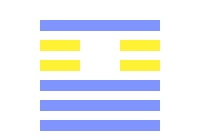
26.1.2.3.4.5.6 (26 > 45) - THE TÂ KHÛ HEXAGRAM.
- 1. The first line, undivided, shows its subject in a position of peril. It will be advantageous for him to stop his advance.
- 2. The second line, undivided, shows a carriage with the strap under it removed.
- 3. The third line, undivided, shows its subject urging his way with good horses. It will be advantageous for him to realise the difficulty (of his course), and to be firm and correct, exercising himself daily in his charioteering and methods of defence; then there will be advantage in whatever direction he may advance.
- 4. The fourth line, divided, shows the young bull, (and yet) having the piece of wood over his horns. There will be great good fortune.
- 5. The fifth line, divided, shows the teeth of a castrated hog. There will be good fortune.
- 6. The sixth line, undivided, shows its subject (as) in command of the firmament of heaven. There will be progress.
26.1.2.3.4.5.6 (26 > 45) - Losing all one's strength
One surrenders before the enemy because the troops did not survive after the assault.
Bing DeepL Google Yandex26.1.2.3.4.5.6 (26 > 45) - Losing all one's strength
One surrenders before the enemy because the troops did not survive after the assault.
Bing DeepL Google Yandex26.1.2.3.4.5.6 (26 > 45) - Tá tchu, le pouvoir contraignant de la grandeur
Tá tchu : 1. Grand entretien ; 2. Dompter, conduire
- 1. Quand il survient quelque danger, il est bon de s’arrêter (se vaincre), de céder aux circonstances et de ne point vouloir l’emporter de force.
- 2. (Comme, par exemple, quand) un char a perdu le cuir qui le maintient en place (droit).
- 3. Celui qui chemine avec des chevaux bien entretenus, sortira heureusement des difficultés. S’il s’exerce chaque jour à conduire et combattre, tout réussira pour lui. (Suite de la bonne éducation.)
- 4. Le joug, la planchette que porte le jeune boeuf est d’un usage très heureux pour le dompter et le former au labourage (second sens).
- 5. Lorsqu’un sanglier est châtré, dompté, ses défenses sont exemptes de danger (et sont plutôt un instrument utile). — Arracher les dents à un sanglier, c’est priver un méchant des moyens de nuire.
-
6. Combien la voie du ciel est étendue ! Qu’elle est immense à parcourir !
Allusion à la forme de l’hexagramme qui représente une montagne au-dessus du ciel. Se rapporte à l’expression tchu kih.
26.1.2.3.4.5.6 (26 > 45) - Perdre toutes ses forces
On capitule devant l'ennemi car les troupes n'ont pas survécu après l'assaut.
Bing DeepL Google Yandex26.1.2.3.4.5.6 (26 > 45) - Ellenőrzés
- 1. Nem akar menni és azonnal megnézni mert nem olyan fontos.
- 2. Otthagyja mert nem bíznak benne.
- 3. Elkíséri.
- 4. A másik erőszakosságának kezelése adakozással.
- 5. Vár amíg a legfiatalabb visszatér javítani.
- 6. Kérik hogy javítsa meg.

